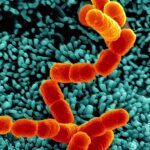Link to Pubmed [PMID] – 10075417
Microbiology (Reading, Engl.) 1999 Feb;145 ( Pt 2):343-55
Mycoplasma penetrans is a mycoplasma with unique morphology, recently identified in urine samples collected from HIV-infected patients. This mycoplasma has been found to be statistically associated with HIV infection, and to be cytopathic in vitro. The dominant antigen recognized during natural and experimental infections is an abundant lipoprotein, P35, which, upon extraction, segregates in the Triton X-114 detergent phase. It is used as the basis of M. penetrans-specific serological assays. Although mycoplasma lipoproteins, including M. penetrans P35, are the main antigens recognized by the host humoral immune response, very little is known about the nature of the epitopes involved. Immunoelectron microscopy revealed that all P35 is exposed at the cell surface and is distributed all over the membrane. P35 linear B-epitopes were mapped by an ELISA approach based on a set of overlapping peptides covering the entire mature polypeptide. The immunoreactivity of the peptides was first tested with sera from immunized animals. The dominant B-epitopes were found at the C- and N-terminal regions, in partial agreement with algorithmic predictions. Patient sera were evaluated with the same assay. Only some reacted with linear epitopes whereas others did not, indicating the importance of P35 nonsequential epitopes. Statistical analysis of the results allowed the definition of a set of peptides which were clearly immunodominant. Finally, the P35-encoding gene was modified by in vitro mutagenesis to allow the production and purification of a recombinant protein (rP35delta0) in Escherichia coil. The antigenicity of rP35delta0 was tested by Western blotting and compared to that of another recombinant product, rP35delta3, a truncated P35 polypeptide. Although rP35delta0 reacted with the M. penetrans-seropositive patient sera tested, rP35delta3 was only immunoreactive with one of six sera. This result confirmed that P35-nonsequential epitopes dominate during M. penetrans infection. Our results have important implications for the understanding of lipoprotein antigenicity during mycoplasma infections. In addition, the P35-derived immunodominant synthetic peptides defined in this study, as well as the purified rP35delta0, provide the antigenic material for the necessary improvement of M. penetrans serological assays.

